Run with patience
Jackie Macadam learns about the life and faith of ultramarathon runner Dr Mark Calder, who is running pilgrim ways to raise funds for charity.
“RUNNING ultramarathons (generally considered any race longer than the traditional marathon distance of 26.2 miles) has come to mean something much more to me than entering a race: it’s become more like a spiritual discipline’ – a deeply spiritual experience.”
Dr Mark Calder, Regional Manager for Scotland and the North of England of charity Embrace The Middle East, is talking about his interest with running around 100 miles on a regular basis, usually to raise funds for Embrace.
“It is certainly one of those disciplines that can be prayerful, transformative, perspective-altering, worshipful, reorienting, humbling, joyful, and sometimes elating. If spiritual means something like the overlap of all of these things, then yes, it’s spiritual.”
Born in the West Midlands, Mark has memories of family hillwalking breaks, and never being sure where they’d end up.
“My dad was from Yorkshire, and my mum from the south, and though we lived in an urban area, we used to get out to the hills as often as my parents could manage, and I have enduring memories of walking fells in the rain, my Dad doubting the compass, and us all ending up thoroughly lost. I’ve thought about these experiences a lot this year as I’ve experienced my own navigational issues – but it’s probably in these that my love for being outdoors was nourished,” he laughs.
“I very much disliked school, but from sixth form began to enjoy studying – despite being seriously inhibited by an inability to write legibly!” he says.
“I moved to Scotland for undergraduate studies in Arabic and Politics at Edinburgh and then later completed my Masters and PhD at Aberdeen in Social Anthropology.
“My research focused on the Syriac Orthodox community in Bethlehem, and questions of identity which emerge from being both descendants of recent refugees, and so ‘outsiders’, while also cherishing a distinctive relationship with Jesus as a very local speaker of Aramaic, the language they use in their liturgy.
“As well as studying it at Edinburgh, I served as vice-president of the Students’ Association and then took a job with an MSP after I’d graduated. Party politics has never felt particularly satisfying to me though, and I’ve invested more of my energies in coming better to understand the politics of Middle Eastern countries, not least through research.”
“I always felt the call of the hills, and one of the reasons I chose to study in Edinburgh was because of access to the Scottish mountains. As it happened, I barely did any walking when a student, and it was only after moving to the north east of Scotland that I began to rediscover a love for trails.”
It was while he was studying in Edinburgh that he met his wife, Karen.
“I met my wife singing in a gospel choir in Edinburgh. I proposed to her in the White Desert of Egypt while I was out there studying Arabic when she came and visited me. We married at St Cuthbert’s in Edinburgh, which was one of the reasons I extended my St Ninian pilgrimage to that church from Queensferry in September.
“We have two children, Bethan and Alya, who are six and three respectively.”
Mark is fascinated by the long distance pilgrimage trails, and it’s not surprising that he and Karen have walked most of the Camino de Santiago route from St Jean Pied de Port. It was during that walk he started to see some similarities between pilgrimage and distance running.
“I ran my first marathon in 2009, at Loch Ness, having signed up on a whim, and by the time that training programme was complete, had come to love running – especially distances which feel like ‘journeys’ rather than exercise sessions.
“It was several years before I ran an ultramarathon, however, starting with the Devil O’ the Highlands footrace in 2016, followed by the Cumbria Way Race and the White Rose 100-miler last year. Whereas my marathons have usually been about finishing in my best time, ultramarathons have felt like a different kind of endeavour – often an intense physical, mental and spiritual discipline.”
Mark managed to combine his love of running with publicising the ancient pilgrimage trails and with raising money for Embrace the Middle East.
He’s run most of them and loves the experience.
“There’s something very pilgrimage-like in running ultras. People talk about pilgrimage as ‘life in miniature’, consisting of compressed seasons of highs and lows, and others which entail simply ticking over. We noticed this on the Camino de Santiago. Ultramarathons are like another level of compression and the seasons come and go a little quicker, but with no less intensity. So this seed had been planted well before Running Home started.
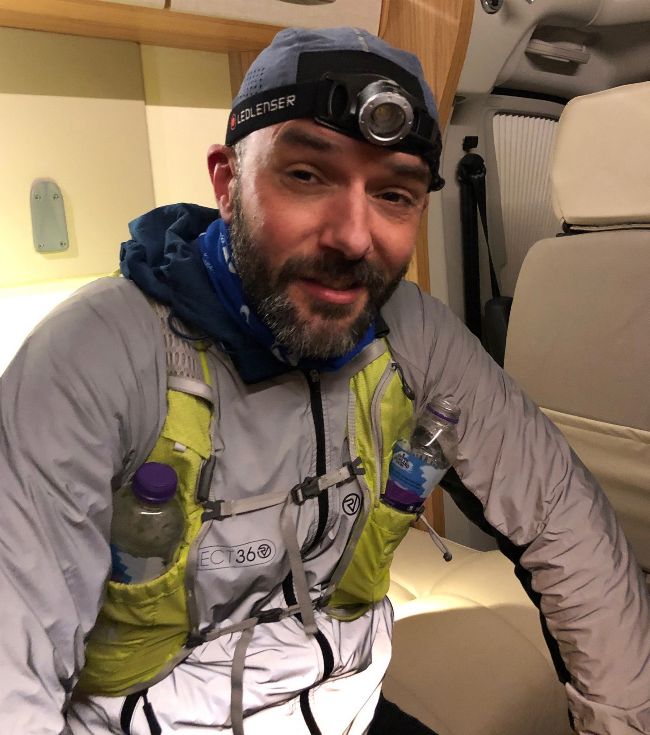
420am: a tortured and aching Mark arriving at St Athernase
ran my first marathon in 2009, at Loch Ness, having signed up on a whim, and by the time that training programme was complete, had come to love running – especially distances which feel like ‘journeys’ rather than exercise sessions.
“Meanwhile, I was very keen to connect the unfolding story in Iraq to the story of our islands, and especially the story of the church here. If the goal is to create a renewed compassion in people here for those in northern Iraq, then doing so with reference to the missions and struggles of local saints quite literally ‘brings it home’.
“My St Columba pilgrimage was special, primarily because of the way it intersected contrasting landscapes. Starting on Inchcolm Island on the Firth of Forth, I ran north through Fife and Kinross, then into the Perthshire hills to Loch Tay and Loch Lyon, west to the Highlands and Loch Etive, before descending to Mull. While it was a tough run, which was nearly aborted due to agonising shin splints, I was left with a completely new sense of how Scotland ‘holds together’. When you walk you can be attentive to the environment in its immediacy, but the additional distance of ultras enabled me to attend to the whole, to the articulation of lowland to highland to islands. This landscape revealed itself as almost a living organism playing host to my tininess in motion.
“Many of the others have been special though. The longest was St Ninian’s run in September which took me from Carlisle to South Queensferry via Whithorn and Glasgow. Two marathons a day for seven days filled me with trepidation beforehand but it was incredible to finish such an undertaking and to come to learn how my body could adapt to fatigue and injury and keep going.
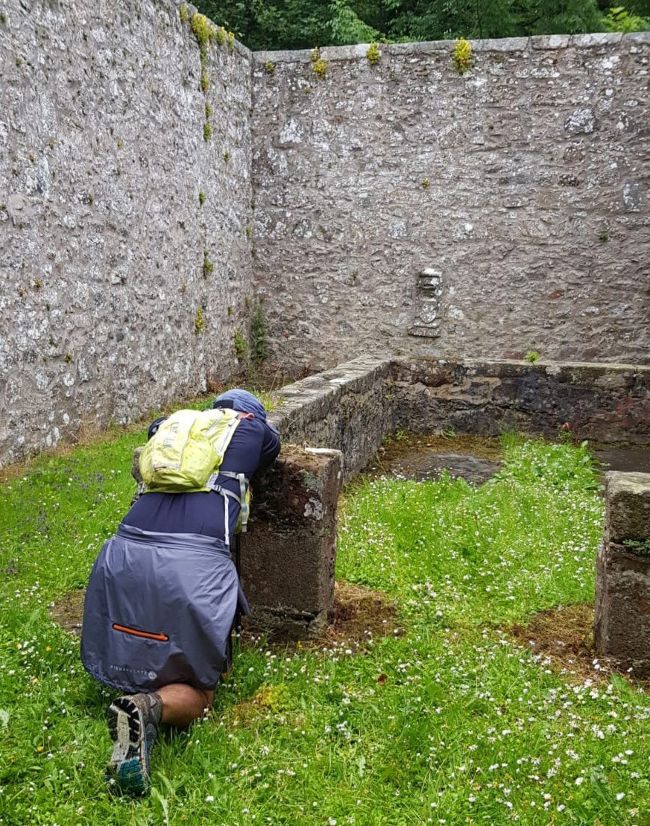
Day 1: Old Deer prayer or snooze
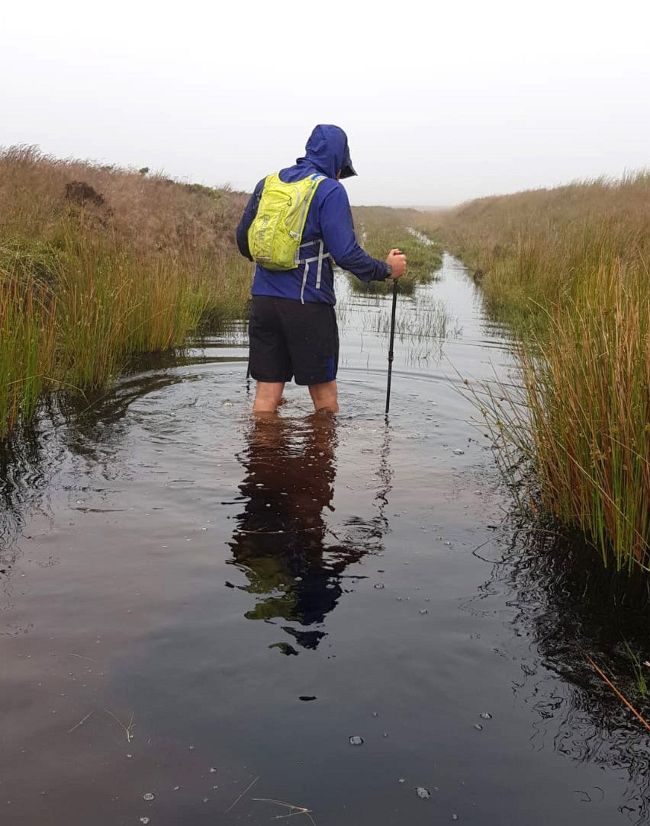
Day 1: Scottish summer
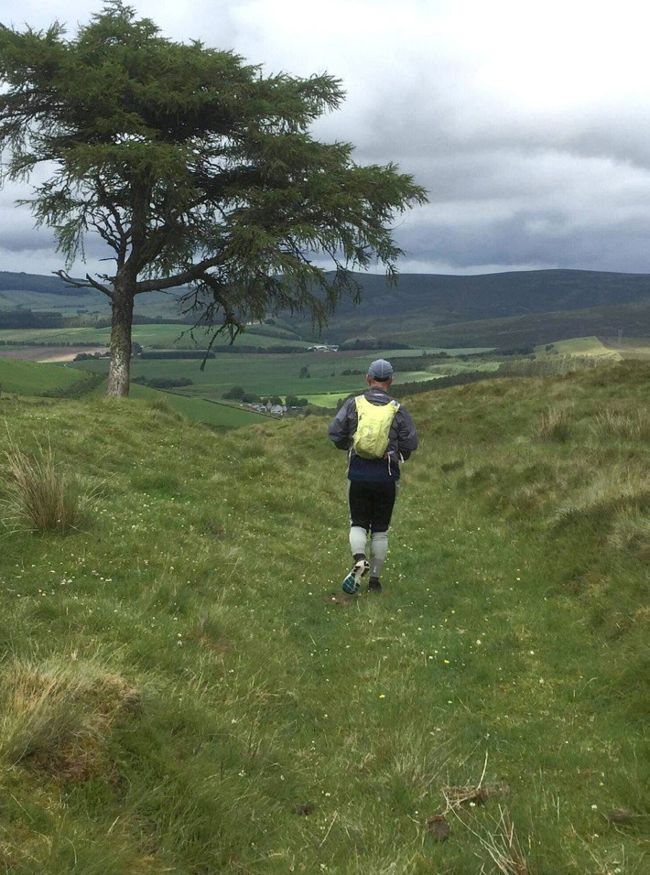
Day 2: larch before Dufftown
“Each run has had its highlights though: services such as those at Glasgow and Durham Cathedrals or at tiny rural churches; days of solitude in beautiful landscapes and days with company helping me deal with the challenges; wildlife from lazing seals to dancing dolphins, colourful birdlife and regal stags.
“On the most recent run, St Bega’s pilgrimage in Cumbria, I had a truly astounding amount of support from family and their friends, running with me in shifts. I felt unwell for most of that run, but their solidarity really kept me going. I’ve come to realise just how much we do depend on others for overcoming adversity.”
Mark feels there is something very special about running the pilgrim routes. He often takes time out to speak to church groups in between his runs.
“So many special things, memorable things, happen when you’re running them.” He says.
“Speaking at Iona Abbey on St Columba’s feast; arriving into South Queensferry to see a group of cheering friends after seven days of running; and smaller moments like seeing a Mums and Toddlers group at Fetteresso Stonehaven engaging with my second run from Aberdeen to St Andrews by adding arrows to a totaliser based on my route map.
“Perhaps strangely, one of the most special moments was a day of abject failure in March. I’d rushed on day one of my St Cuthbert pilgrimage in order to get from Melrose to Lindisfarne in time to cross the tidal causeway safely. I made a hasty exit from the support vehicle at lunchtime and forgot my phone charger, was thereafter without comms, and didn’t get any support until well after dark. As a consequence I dehydrated. The next day, setting off from Lindisfarne towards Warkworth, I only made about 10km before having to quit through sickness – the only time I’ve lost a day on this project.
“I called upon Embrace the Middle East volunteers in Alnwick who let me rest in their spare room, and as I lay there expecting a wave of despondency due to failure, I felt a wave of peace. My life was no less valuable lying broken than when I was triumphing on the hills. This was an opportunity to learn about rushing, and from that moment on, ‘Run with patience’ became my motto.”
“My last role before working for Embrace the Middle East involved writing a report on civil society peacebuilding in Syria for the British Council. It was a disheartening experience. I became quite cynical afterwards.
“I was encouraged to apply for the job at Embrace and did so almost reluctantly, but at interview and then induction, came to see in this organisation a number of encouraging attributes. Above all, Embrace has, for 160 years, undertaken the painstaking work to identify local Middle Eastern Christian partners who are committed to their communities and understand better than we can the local dynamics which make the difference between an effective project and one that causes more harm than good.”
He started working with Embrace the Middle East in 2017.
“Sometimes it can be tempting to view the kind of work we do – whether helping refugees, or supporting hospitals and disability facilities, or children’s work – as mundane, even inadequate in the face of the huge geopolitical challenges in the region. And yet, the modesty of this work is closely linked to this principle of ‘do no harm’: it is about making a real and sustained difference in people’s lives without damaging the relationships between communities and between direct beneficiaries and others.
“Another element of this is the fact that Christian voices from the Middle East, in all their diversity, are represented in and help to drive our work. In my academic research it was clear that most of the problems faced by a marginalised Christian in a given country would be the same as those faced by a marginalised Muslim. To frame their struggles primarily in terms of the distinctives of their faith community strikes me as, at best, unhelpful. In particular, the region’s Christians seem often to be reduced to passive victims in western media accounts, but the story is much more complex than ‘a persecuted minority’ desperate to leave. Our Christian partners may face particular struggles but they’re not passive, that’s for sure – they’re agents of change in their communities and committed to their homelands.
“This more nuanced, attentive approach to our partners’ experiences is too rare, and is major element in my real commitment to this organisation’s work.”
His passion for the Middle East and the work being done there by Embrace is undiminished.
“I would want to stress that it feels like a ‘now or never’ moment in northern Iraq. After four decades of struggle for the Iraqi population, the ancient pluralism of that country is in serious jeopardy. People fled from Daesh repeatedly as they advanced through Iraq, some ending up in refugee camps at the Turkish and Syrian borders.
“That people are considering returning home is encouraging, but the question is, to what are they returning? While the physical rebuild is well underway, repairing the economic and social context is a much more significant challenge: people have missed out on years of education and training; small business owners have lost everything; and some significant mistrust has built up over these decades between the communities which have previously dwelt well together.
“We don’t know how this story will end, but a few courageous people are bravely turning their faces towards home and they deserve all the help they can get. We’re focusing on livelihoods so that they can put roots down deeply in their home towns and be fruitful for generations to come. It’s a remarkable privilege to play a small role in investing in this future, in changing the ending of this story, and I would urge people to consider generously giving to this cause.”
Help Mark by donating at www.runninghome2019.co.uk
My life was no less valuable lying broken than when I was triumphing on the hills. This was an opportunity to learn about rushing, and from that moment on, ‘Run with patience’ became my motto.”
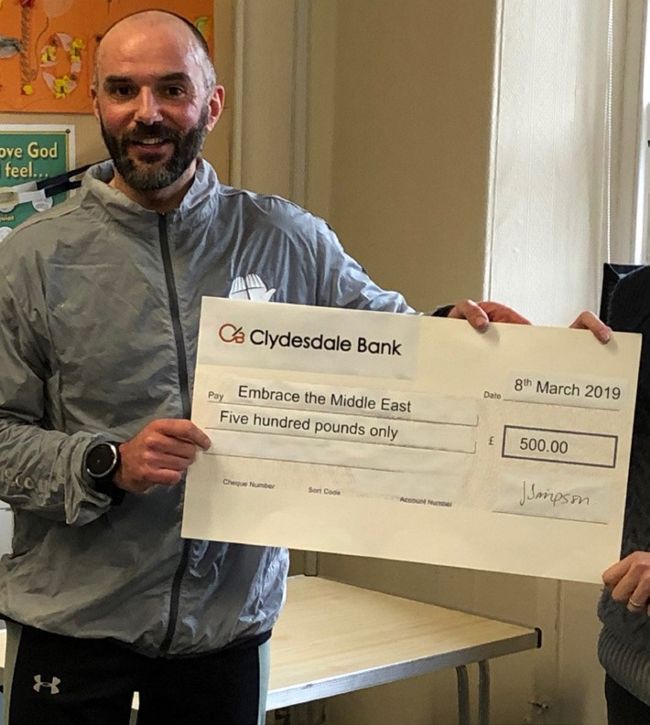
Generous donation from Bervie Parish Church
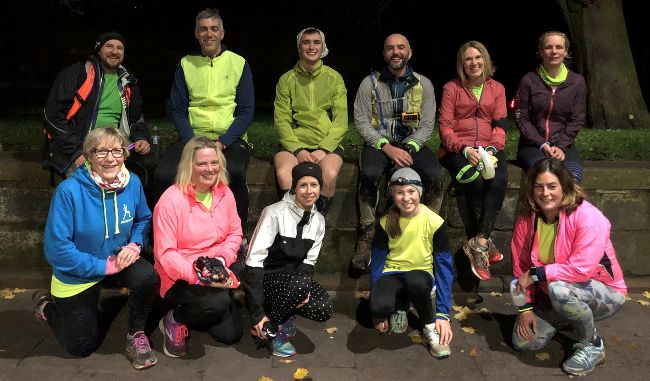
Carlisle Cathedral Bega group